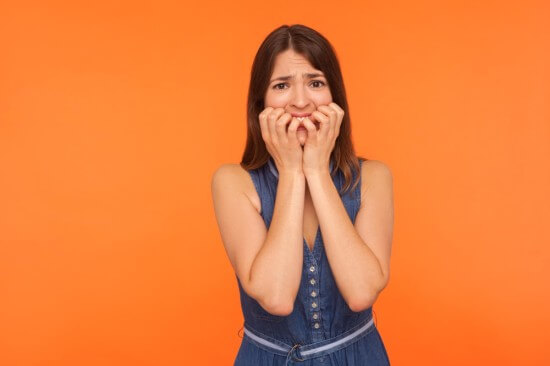Is there any relationship between Hormones and Anxiety?
By Prapoorna M
Last Updated: November 27, 2021
Everyone has felt it at one time or the other. It just comes as a surprise and you sometimes don’t even notice. Yes, the indicators pronounce it for you. Anxiety is the name. Many of us worry that hormone imbalances are the cause of many of our health problems. Let alone the effect of hormones on our physical health, but mental health is sure to get affected.
Our mood disorders, depression, stress, anxiety, and other mental ailments are strongly related to the play of hormones in our body. Let’s try to understand how Anxiety comes into the picture when our hormones are at play, because, learning the occurrence of effects can help us balance them.
Our mental health is directed by our brain, which is driven by chemicals called neurotransmitters. When hormone levels in our body are too high or too low, neurotransmitters get affected, resulting in increased anxiety. Anxiety is a disorder that is more persistent with worry, fear, and stress.
Also read: Is anyone else’s Anxiety going crazy with all that’s going on in the world?

The Key Hormones
The neurotransmitters serotonin, dopamine, Norepinephrine, and gamma- aminobutyric acid (GABA) are specifically believed to be linked to mood and anxiety disorders. Serotonin is associated with mood, sleep, appetite, and other regulatory functions in the body. Dopamine influences a person’s energy levels, attention, rewards, and movements. But if the dopamine is imbalanced, that leads to anxiety.
Norepinephrine is related to flight-or-fight response and hence affects anxiety. GABA helps in balancing agitation and excitement giving the feelings of calmness and relaxation. The fluctuation of estrogen and progesterone in your body can cause feelings of anxiety or depression. In women, while estrogen increases serotonin keeping you happy, progesterone gets released slightly after ovulation which causes an anxious mood. The progesterone hormone stimulates the amygdala, the part of the brain responsible for fight-or-flight responses, making the person feel stressed and dull.
The hormones that may increase anxiety are mostly Stress hormones, Sex hormones, and, Thyroid hormones. Understanding their effect on our mind and body can help us manage the impact of those hormones on us.
Affect of Stress, Sex and Thyroid Hormones
Stress hormones are released when we are overwhelmed like during fight-or-flight response or out-of-control situations that make us anxious. Adrenaline and cortisol hormones are released to help us cope with such stressful situations and to act accordingly. But when there’s no physical threat, excess release of these hormones can make anyone feel anxious.
When this state is continuous, the person may feel very anxious leading to panic attacks or feeling an urgency to escape from the place. This condition triggers more release of stress hormones and this, in turn, increases anxiety, while that increased anxiety further increases the hormone release, making it a vicious cycle.
When anxiety triggers, people tend to adopt coping mechanisms. Self-medication or coping mechanisms like smoking, drinking, sugar, or caffeine in-take might provide a surge of relief for a certain period, but they don’t serve the purpose of solving the long-term problem. In addition to that, they might lead to other health problems. The Sex hormones named estrogen and testosterone also have their effect on increased anxiety levels. The hormonal changes are high during puberty.
Very low levels of testosterone result in increased levels of anxiety and when the testosterone levels are high, the anxiety gets reduced. In women, the estrogen hormone contributes to anxiety. It is due to this during puberty and menopause, the anxiety levels are high.
The combined effect of sex hormones and stress hormones can also cause anxiety. For instance, when a person is stressed, the cortisol hormone gets released. But that release of cortisol lowers the ability of testosterone production. This combined effect of increased cortisol and decreased testosterone, in turn, increases anxiety. To make it worse, the partial control that testosterone has on cortisol also increases cortisol production leading to a further increase in anxiety.
This is why we find increasing anxiety sometimes for a simple reason. The symptoms get reduced only when this cycle is interrupted. Thyroid hormones are also the culprits in increasing anxiety. An overactive thyroid hormone can create anxiety through its symptoms like increased heart rate, sweating, and shakiness in the body.

Anxiety in Men and Women
Just as little testosterone would increase anxiety higher levels of it would also reduce it. The science behind the truth is that men are reported to have half the anxiety disorders that women have, which may be the higher levels of testosterone. The two brain chemicals named gamma-aminobutyric acid (GABA) and serotonin are boosted by high testosterone levels which help in reducing social anxiety.
Also, the part of the brain named the amygdala, which senses the fear and initiates the fight-to-flight response, becomes less active down due to the high levels of testosterone. The fluctuation in Estrogen levels affects anxiety in women. During the menstrual cycle, when the estrogen levels are low, their anxiety increases. Likewise, when the estrogen hormone increases, a sense of calmness is observed.
Hormones that help reduce Anxiety
Apart from anxiety-elevating hormones, some hormones alleviate anxiety. The most popular among such hormones are Oxytocin and Vasopressin. Oxytocin, the love hormone helps in reducing anxiety. Oxytocin promotes trust, relaxation, and stability which help in managing our anxiety. Vasopressin is a hormone that regulates fluid balance in the brain. It regulates anxiety, stress coping, and social behavior in a person.
A balance between oxytocin and vasopressin helps in optimal social functioning. Vasopressin hormone is particularly related to social behavior, sexual motivation, pair-bonding and maternal responses to stress. To reduce the anxiety levels, one can follow certain habits like, exercising regularly, eating a balanced diet, minimizing stress and having enough sleep which can boost the testosterone levels in the body.
Cuddling a loved one, petting a dog or cat, serving food and giving gifts, being generous and expressing
gratitude, being kind to others and listening to them etc., improve the oxytocin levels in our body. Doing all these things, lowers our stress levels and improves calmness in us, thus lowering the anxiety.
Are you looking a way to deal with your anxiety? Our experienced psychologists are ready to help you, either online or offline. Book an appointment, today.
Book your Free Consultation Today
Parent/Caregiver Info:
Client’s Details:
* Error Message









